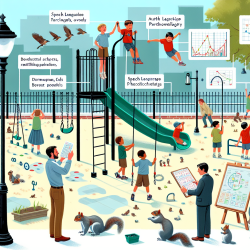Introduction
As a dedicated professional in speech language pathology, my focus is on leveraging data to improve outcomes for children. The recent study, Playground Renovations and Quality at Public Parks in Boston, Massachusetts, 1996-2007, offers valuable insights into how environmental changes can significantly impact children's physical activity and development. The study highlights the importance of playground quality in promoting active play, which is crucial for children's physical and mental health.
Key Findings from the Study
The study conducted by Barrett et al. (2011) utilized an observational pretest-posttest design to assess playground renovation rates and quality improvements across Boston's public parks. The findings revealed that:
- Renovation rates were equitable across city areas, with a focus on parks in disadvantaged neighborhoods.
- Playground quality scores improved significantly in parks that were renovated, particularly those initially identified as low-scoring.
- Bicycle and pedestrian access around parks showed room for improvement, suggesting further opportunities to enhance physical activity.
Implications for Practitioners
For practitioners in the field of child development and education, these findings underscore the importance of advocating for and implementing data-driven improvements in community infrastructure. By understanding and applying the outcomes of such research, practitioners can help create environments that support children's physical and cognitive development.
Here are some actionable steps practitioners can take:
- Advocate for Quality Improvements: Use data to advocate for playground renovations in your community, focusing on areas with the greatest need.
- Engage with Local Authorities: Collaborate with local government and community organizations to prioritize and fund necessary improvements.
- Promote Safe Access: Work with urban planners to ensure safe and accessible routes to playgrounds, enhancing opportunities for active transportation.
Encouraging Further Research
While the study provides a comprehensive look at playground renovations in Boston, it also opens the door for further research. Practitioners are encouraged to conduct similar studies in their communities to assess the impact of environmental changes on children's development. This could involve:
- Evaluating the long-term effects of playground renovations on physical activity levels.
- Exploring the relationship between playground quality and cognitive or social development.
- Investigating the impact of improved access and safety measures on community health outcomes.
Conclusion
By embracing data-driven approaches and fostering collaboration among stakeholders, we can create environments that not only promote physical activity but also support the holistic development of children. The study on Boston's playgrounds serves as a model for how targeted renovations can lead to significant improvements in community health and well-being.
To read the original research paper, please follow this link: Playground Renovations and Quality at Public Parks in Boston, Massachusetts, 1996-2007.










